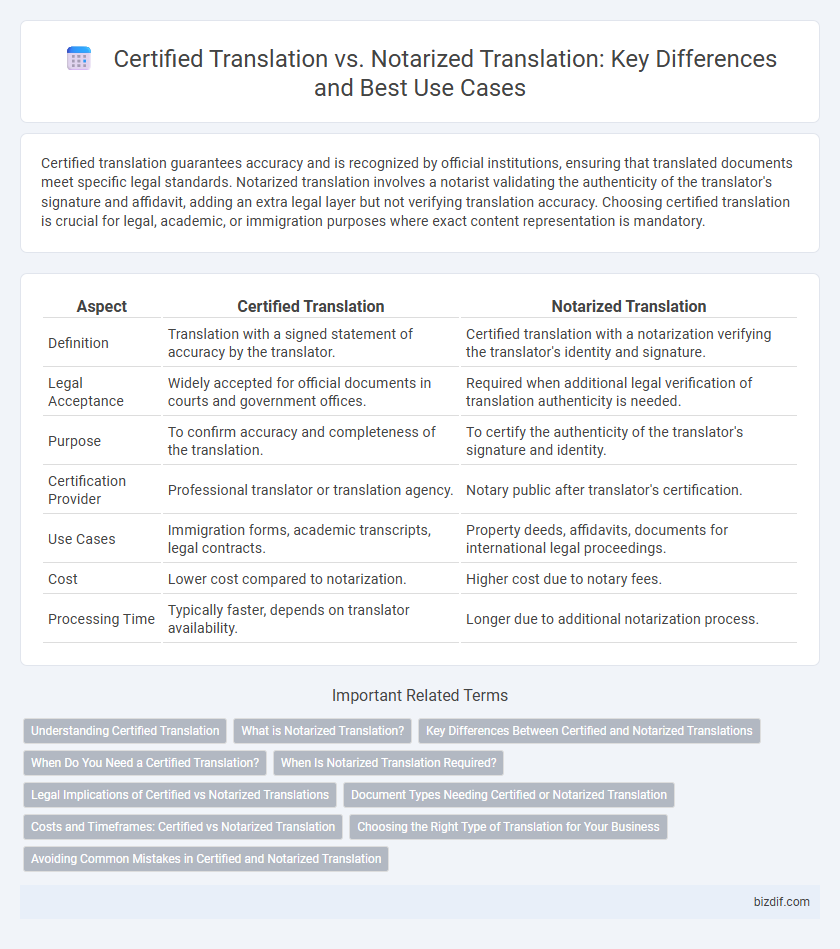Certified translation guarantees accuracy and is recognized by official institutions, ensuring that translated documents meet specific legal standards. Notarized translation involves a notarist validating the authenticity of the translator's signature and affidavit, adding an extra legal layer but not verifying translation accuracy. Choosing certified translation is crucial for legal, academic, or immigration purposes where exact content representation is mandatory.
Table of Comparison
| Aspect | Certified Translation | Notarized Translation |
|---|---|---|
| Definition | Translation with a signed statement of accuracy by the translator. | Certified translation with a notarization verifying the translator's identity and signature. |
| Legal Acceptance | Widely accepted for official documents in courts and government offices. | Required when additional legal verification of translation authenticity is needed. |
| Purpose | To confirm accuracy and completeness of the translation. | To certify the authenticity of the translator's signature and identity. |
| Certification Provider | Professional translator or translation agency. | Notary public after translator's certification. |
| Use Cases | Immigration forms, academic transcripts, legal contracts. | Property deeds, affidavits, documents for international legal proceedings. |
| Cost | Lower cost compared to notarization. | Higher cost due to notary fees. |
| Processing Time | Typically faster, depends on translator availability. | Longer due to additional notarization process. |
Understanding Certified Translation
Certified translation involves a professional translator attesting to the accuracy and completeness of a document's translation, often required for official or legal use. This process ensures the translated document is accepted by government agencies, courts, and educational institutions. Unlike notarized translation, certified translation does not require a notary public's signature but relies on the translator's declaration of authenticity.
What is Notarized Translation?
Notarized translation is a document translation authenticated by a notary public, verifying the identity of the translator and the authenticity of the signed affidavit accompanying the translation. This process ensures the translated document's legal acceptance in official and governmental procedures. Unlike certified translation, which is endorsed by the translator's declaration, notarized translation involves formal notarization adding an extra layer of legal validation.
Key Differences Between Certified and Notarized Translations
Certified translations are official documents translated by a professional translator who provides a signed statement affirming the accuracy and completeness of the translation. Notarized translations involve the additional step of having a notarist publicly attest to the authenticity of the translator's signature, but do not guarantee the translation's accuracy. Certified translations are typically required for legal, immigration, and academic purposes, while notarized translations may be requested to verify the identity of the translator rather than the content itself.
When Do You Need a Certified Translation?
Certified translations are required when submitting official documents such as birth certificates, legal papers, or immigration forms to government agencies that mandate verification of accuracy. This type includes a signed statement from the translator or translation company affirming the completeness and fidelity of the translation to the original text. Certified translations are essential for court cases, visa applications, and academic admissions where precise documentation is critical.
When Is Notarized Translation Required?
Notarized translation is required when legal documents need authentication to be accepted by courts, government agencies, or foreign authorities, ensuring the translation's accuracy and the translator's identity are verified. Certified translation typically involves a signed statement from the translator attesting to the accuracy of the translation but does not include notarization. For immigration papers, property deeds, or affidavits submitted to official bodies, notarized translations provide an added level of legal validity and trust.
Legal Implications of Certified vs Notarized Translations
Certified translations are often required by government agencies, courts, and educational institutions to ensure the accuracy and authenticity of legal documents. Notarized translations involve a notary public verifying the identity of the translator but do not guarantee the translation's accuracy or legal acceptance. Legal implications arise as certified translations carry a sworn statement of accuracy, making them essential for official proceedings, whereas notarized translations may be insufficient for legal validation.
Document Types Needing Certified or Notarized Translation
Certified translation is required for official documents such as birth certificates, marriage licenses, and academic transcripts, where accuracy and authenticity are critical for legal recognition. Notarized translation is often necessary for financial documents, contracts, and affidavits that demand a formal sworn statement by a notary public to verify the translator's identity and signature. Understanding the specific document type ensures compliance with legal standards and acceptance by government agencies, courts, and educational institutions.
Costs and Timeframes: Certified vs Notarized Translation
Certified translation typically costs less and can be completed within 24 to 72 hours, making it a faster and more affordable option for official documents. Notarized translation involves an additional step of notarization by a certified notary public, increasing the overall cost and extending the timeframe to several days or even weeks. The choice between certified and notarized translation depends on specific legal or institutional requirements, with notarized translations often necessary for immigration or court proceedings.
Choosing the Right Type of Translation for Your Business
Certified translation ensures accuracy and legal acceptance by providing a translator's declaration of authenticity, making it essential for official documents in business contracts, immigration, or patents. Notarized translation adds a notary public's certification to the certified translation, further validating the document's legitimacy for international transactions or court submissions. Selecting between certified and notarized translations depends on the specific legal requirements and intended use of your business documents to guarantee compliance and credibility.
Avoiding Common Mistakes in Certified and Notarized Translation
Certified translation requires an official statement from a qualified translator affirming the accuracy and completeness of the translated document, while notarized translation involves a notary public validating the authenticity of the translator's identity and signature. Avoid common mistakes by ensuring certified translations include the translator's credentials and signature, and notarized translations are accompanied by proper notary seals and stamps. Always verify the specific legal requirements of the receiving institution to avoid rejection or delays caused by improper certification or notarization.
Certified Translation vs Notarized Translation Infographic

 bizdif.com
bizdif.com